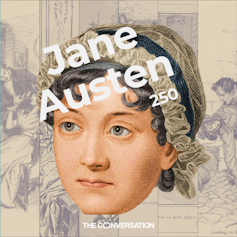Why Jane Austen is definitely not just for girls
In my former life as a teacher, I once had a job interview in which I was asked how I dealt with the problem of teaching Jane Austen to boys.
Having had experience of this situation, I confidently told my interviewer (a maths teacher) that the “problem” they were assuming didn’t actually exist, and that it was perfectly possible to teach Austen’s novels to mixed-sex classes with successful results. My answer was met by barely veiled scepticism – and suffice to say, I didn’t get the job.
But where did this popular perception come from? Austen’s genius has been recognised from the earliest days of the development of a canon of English literature, and has never really fallen out of fashion. So it might seem odd that the suitability of her work for a co-educational class is the subject of genuine debate.

This article is part of a series commemorating the . Despite having published only six books, she is one of the best-known authors in history. These articles explore the legacy and life of this incredible writer.
The increasingly intertwined associations of Austen’s literature with the many (often excellent) adaptations of her work may not help the matter, with screen retellings often foregrounding the love stories and losing much of the ironic tone that characterises Austen’s narrative style.
The myriad repackaged editions of her novels that adorn bookshelves with pastel-toned floral designs, or images of anonymous portraits of passive young women, also do little to challenge the popular perception of these books as stories for women and girls.
Finally, and perhaps most troublingly, is the still-commonly held notion that stories with a female protagonist do not have wide-ranging appeal and must be consigned to a “niche interest” bracket. Male-led stories, in contrast, have long been considered to hold universal relevance for audiences.
This last point is a bigger issue concerning the publishing and entertainment industries, so I will largely park this one. But I will point out that, as others have argued in relation to Austen’s work, the classroom is an excellent place to start countering the assumptions of the “everyman” male experience, in contrast to the “special interest” attitude to female perspectives.
With regards to the teaching of Austen’s novels, drawing on my experiences both as a scholar and as a teacher, I believe her novels can speak to young readers of different genders and from diverse backgrounds.
Addressing the ways in which Austen’s novels tend to be packaged, I asked my students, typically aged 16-18, to explore the ideas at the heart of the novels by redesigning the book covers to better reflect these themes.
The flowers and passive young women were gone. The redesigned book covers often focused on the idea of wealth, through pictures of differing piles of money, or power, such as the image of imbalanced scales to symbolise the unequal societies inhabited by Austen’s characters.
Because, as much as they are love stories, Austen’s heroines typically achieve their “happy endings” against a backdrop of money worries, power struggles, familial tension and gendered social hierarchies. While her novels are rightly celebrated for highlighting the unequal treatment of the sexes during her lifetime, it is reductive to see this as their sole contribution to social commentary.
Take Austen’s last completed novel, Persuasion. Here, Anne Elliot – over the hill at the ripe old age of 27 – begins the novel by rueing her broken engagement to Captain Wentworth, which she had been persuaded to break off eight years earlier due to his lack of fortune.
While the narrative focus is on Anne, who is left to regret her choice and wonder whether she will ever be able to escape her odious father and siblings, the broken-hearted Wentworth, who reappears in Anne’s life shortly after the start of the novel, is at least as much a victim of the situation as Anne herself.
At its heart, this is a story of a young woman who allowed herself to be persuaded to make a bad choice, and a young man who, through no fault of his own, was deemed not good enough due to his lack of wealth. The experiences of these characters, although they are older than the average school student, are highly relatable and sympathetic to many teenagers, who may well have experienced meddling family members or unfair judgments of their own.
Take also Northanger Abbey, in which fanciful Catherine Morland mixes fact and fiction and imagines the titular abbey to be a site of gothic intrigue, only to discover that the real horror derives from a controlling patriarch and his sexually predatory oldest son.
Here again, the novel cleverly makes the point that social inequalities, and the choices of those motivated by their love of money and power, are the real darkness at the heart of Austen’s society.
In my experience, students of all genders have been able to appreciate and relate to Northanger Abbey’s depictions of the loss of innocence, class inequality, and the experience of being subject to the sometimes obscure decisions of more powerful individuals.
Austen’s works, far from being the simple love stories of popular perception, are also razor-sharp satires of social and gendered inequalities. Full of witty observations and universally relatable experiences, there is a reason for the consistent popularity of her writing 250 years after her birth.
To fail to recognise this in the classroom is to do a disservice to all our students, as well as to Austen herself.
You may also like...
Diddy's Legal Troubles & Racketeering Trial

Music mogul Sean 'Diddy' Combs was acquitted of sex trafficking and racketeering charges but convicted on transportation...
Thomas Partey Faces Rape & Sexual Assault Charges

Former Arsenal midfielder Thomas Partey has been formally charged with multiple counts of rape and sexual assault by UK ...
Nigeria Universities Changes Admission Policies

JAMB has clarified its admission policies, rectifying a student's status, reiterating the necessity of its Central Admis...
Ghana's Economic Reforms & Gold Sector Initiatives

Ghana is undertaking a comprehensive economic overhaul with President John Dramani Mahama's 24-Hour Economy and Accelera...
WAFCON 2024 African Women's Football Tournament

The 2024 Women's Africa Cup of Nations opened with thrilling matches, seeing Nigeria's Super Falcons secure a dominant 3...
Emergence & Dynamics of Nigeria's ADC Coalition

A new opposition coalition, led by the African Democratic Congress (ADC), is emerging to challenge President Bola Ahmed ...
Demise of Olubadan of Ibadanland
Oba Owolabi Olakulehin, the 43rd Olubadan of Ibadanland, has died at 90, concluding a life of distinguished service in t...
Death of Nigerian Goalkeeping Legend Peter Rufai

Nigerian football mourns the death of legendary Super Eagles goalkeeper Peter Rufai, who passed away at 61. Known as 'Do...





